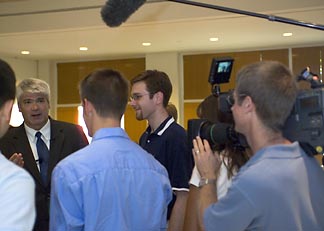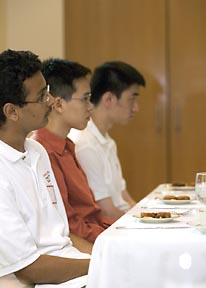Aspiring engineers get unexpected lesson on dining etiquette
By Thomas Oberst

Want to design bridges? Better mind your manners.
This was the message Robert A. Shutt, president of RASolutions of Binghamton, N.Y., tried to impart to a banquet hall full of 20-year-old engineering students Aug. 4 at Cornell University.
His presentation on business dining etiquette at the annual Engineering Co-Op Send-off Dinner came as a surprise to many of the technically minded students. For the past two years, they have been taking classes with such names as Mechatronics, Computational Linguistics, Fluid Mechanics and Design of Concrete Structures -- a curriculum that doesn't typically cover social graces.
So telling engineers it matters if they tip their soup bowl can be a hard sell.
"Did we accidentally come to a dinner for the School of Hotel Administration?" joked one young woman student.
But administrators in Cornell's College of Engineering did not make a mistake when they hired Shutt to talk on table manners. Training sessions on topics of etiquette and interpersonal skills have become a growing trend at universities and businesses across the country intent on giving their young professionals an edge on success.
Speaking to 150 aspiring engineers seated at tables covered in white linens and fine china, Shutt suggested that although the students may have the technical skills to become innovators of the future, they will have a tough time landing their dream job at an upper-tier engineering firm without developing some business etiquette skills as well.
"On average, in any field, 85 percent of one's success in getting hired, keeping a job and being promoted depends on their interpersonal ability," he told the students, citing three independent research studies from Stanford and Harvard universities and the Carnegie Institution on the topic.

Also attending the dinner were CBS News correspondent Jim Axelrod '85, his producer and a camera crew to cover the event for CBS Evening News. "In addition to politics and war, we also like covering cultural stories," said Linda Karas, Axelrod's producer, noting that the story is one that will appeal to the CBS audience. Axelrod, who graduated with a B.A. in history from the College of Arts and Sciences, said that for him Cornell was a natural choice as a reporting location.
Shutt, 50, was a professor of business administration for more than 25 years before he founded the one-man company RASolutions in 2002 in response to numerous requests to speak to graduating seniors at universities about etiquette. "Imagine this," posed Shutt to the students. "You are interviewing a person over dinner for a position at your company, and just as they start to tell you their power point -- the point that is going to land them the position -- they snatch a handful of crackers and smash them all over their soup. After that, you can't even remember what they said."
It is not about worrying that someone will judge you for your manners, explained Shutt. Rather, it is about using etiquette to keep the dinner focused on the business.
That is why Shutt admits to always eating a double cheeseburger from a local fast-food chain before every business dinner. "If you are too hungry you risk that others may perceive you as more interested in food than business."
Shutt, wearing a suit and tie, entertained the audience with his animated presentation style. At one point he drew laughter by pretending to blot his armpits with a linen napkin. Later he leaped off the stage to engage students in enactments of situations at business dinners. He provided guidance on topics as diverse as accidentally passing gas, talking with spinach stuck in a tooth, what to order, what silverware to use when and whether to tip the soup bowl (don't).
He also made references to the military origins of much of today's etiquette. In one anecdote, Shutt explained that keeping the sharp edge of a knife facing inward at all times was a signal of peace at gatherings between medieval warlords -- the first "business dinners."
Cornell's Engineering Co-op program enables students to spend the junior year fall semester interning at companies as preparation for entering the workforce. The annual send-off dinner serves as the last gathering before the students travel to their internships.
James Yoon, a junior from New Jersey in the School of Operations Research and Industrial Engineering, didn't know what to expect before the dinner. "I learned that the most important aspect of a business dinner is conversation," he said afterwards. "The tools we have outside the classroom are just as important, if not more important, than what we learn academically." Yoon plans to do his co-op internship at Empower Solutions in Atlanta.
Szymon Rozga, a junior from Puerto Rico in computer science who will be interning at Amazon.com in Seattle, said that while many of the things Shutt covered were obvious, he felt others were far-fetched. "The most important thing I learned was to eat before the actual dinner -- that way I can concentrate on business," he observed. "I should have gotten a burger before the co-op dinner."
Thomas Oberst is a student writer intern at the Cornell News Service.
Media Contact
Get Cornell news delivered right to your inbox.
Subscribe